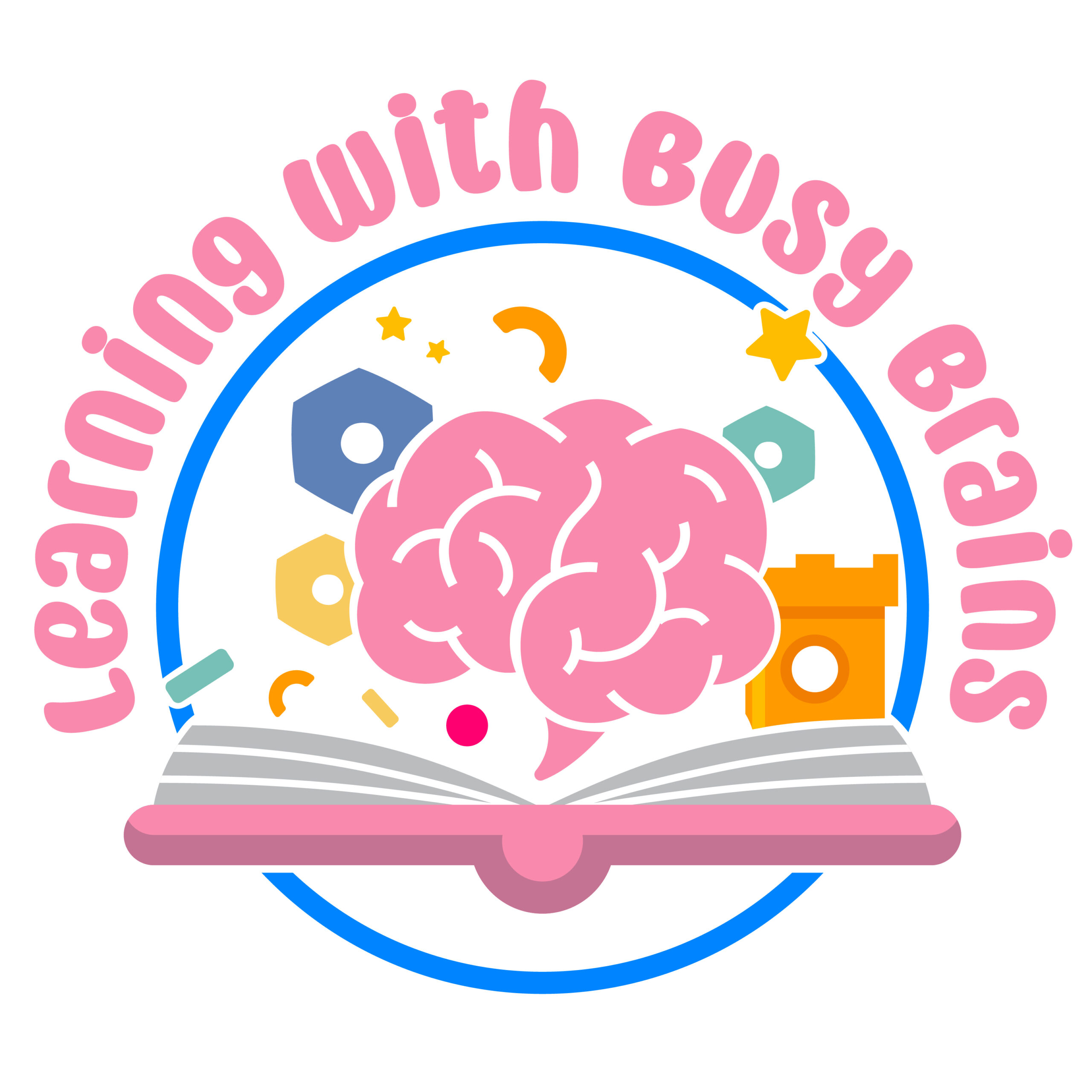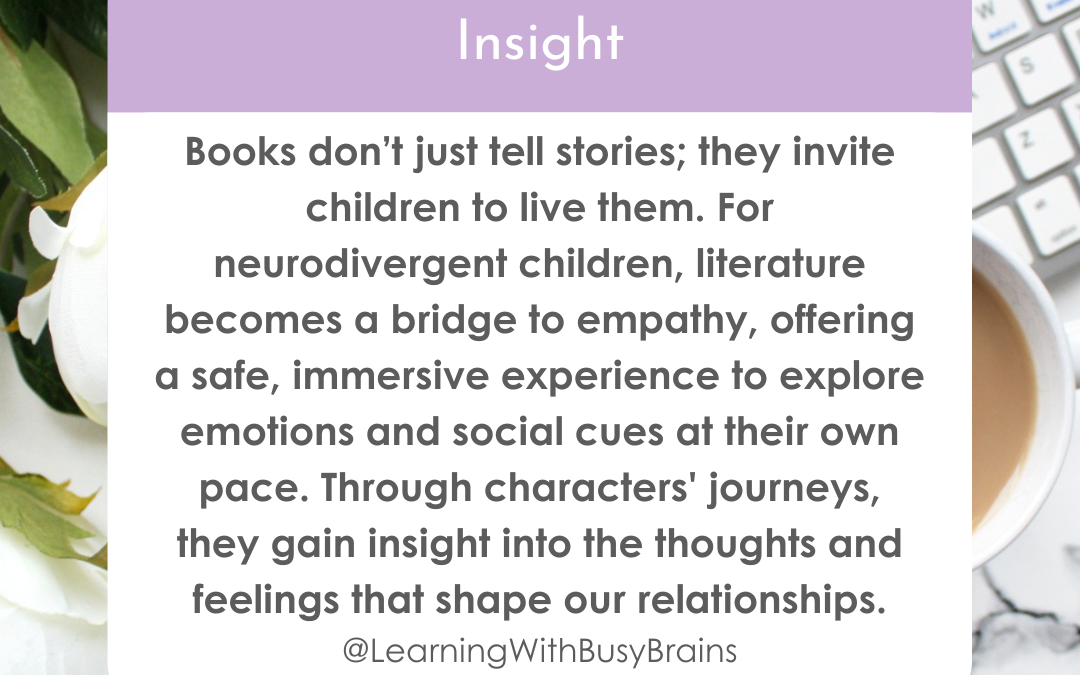Reading is often seen as a gateway to knowledge, imagination, and personal growth. For neurodivergent children, literature can also serve as a powerful tool to nurture empathy and emotional intelligence. In a world where social cues and emotions might not always be easy to grasp, stories can provide a safe and engaging way to explore the experiences, feelings, and perspectives of others.
How Stories Foster Empathy
Empathy, the ability to understand and share the feelings of others, can be challenging for children with ADHD or autism, particularly when social interactions feel overwhelming. However, stories offer a structured, low-pressure environment for children to encounter different characters, situations, and emotions.
By stepping into the shoes of characters, neurodivergent children can:
- See the world from different perspectives: Stories help children view the world through the eyes of others, broadening their understanding of various emotions, motivations, and reactions.
- Recognize emotions in different contexts: Literature allows children to identify emotions in a more digestible way. Characters express sadness, happiness, anger, and fear, often in clear, narrative terms, helping children learn to recognize these emotions in real-life interactions.
- Practice responding to different situations: Through reading, children can vicariously experience social situations and practice emotional responses. This helps build emotional resilience and understanding without the stress of direct social engagement.
Choosing the Right Books
Not all books are created equal when it comes to fostering empathy and emotional growth. For neurodivergent children, selecting the right kind of literature is key. Look for books that:
- Feature diverse characters and perspectives: Stories with a range of experiences (cultural, neurodivergent, or emotional) help broaden a child’s worldview and foster understanding.
- Focus on emotions and relationships: Books that explicitly address emotions, friendships, conflicts, or family dynamics can guide children to identify and reflect on these aspects in their own lives.
- Use relatable, accessible language: For children who may struggle with abstract concepts or nuanced dialogue, stories that clearly articulate emotions or provide concrete examples of empathy are more likely to resonate.
For example, books like Wonder by R.J. Palacio or Inside Out and Back Again by Thanhhà Lại are excellent choices. Both books focus on characters who face social challenges and experience a range of emotions, helping readers understand complex feelings in a way that’s both accessible and engaging.
Here are some additional book suggestions that also focus on characters facing social challenges and exploring a range of emotions:
- The One and Only Ivan by Katherine Applegate
This story, narrated by a gorilla, touches on themes of friendship, captivity, and the desire for freedom, helping readers empathize with those who are different from them. - Fish in a Tree by Lynda Mullaly Hunt
Fans of Wonder will appreciate this novel, which follows a girl with dyslexia and highlights the importance of understanding and acceptance in the face of learning differences. - Because of Winn-Dixie by Kate DiCamillo
This heartwarming story about a girl and her dog addresses themes of loneliness, friendship, and the importance of community. - The Curious Incident of the Dog in the Night-Time by Mark Haddon
This novel provides a unique perspective on social interactions and emotions through the eyes of a young boy with autism, helping readers understand neurodiversity. - El Deafo by Cece Bell
This graphic novel, based on the author’s lived experience, depicts her journey growing up deaf and navigating friendships, making it an engaging way to understand different perspectives.
These books can enhance discussions about emotions, empathy, and social challenges, making them excellent choices for fostering understanding in neurodivergent children.
Considerations for Muslim Families:
- Content Review: Before sharing these books with children, it’s always a good idea for parents to read them first to ensure they align with their family’s values and beliefs.
- Discussion Opportunities: Each of these books can provide excellent discussion points about emotions, social interactions, and empathy, making them valuable for families looking to foster understanding in neurodivergent children.
- Islamic Context: Parents can connect the themes in these stories to Islamic teachings, enhancing the reading experience and reinforcing family values.
Encouraging Conversations Around Stories
Reading alone is beneficial, but engaging your child in conversations about the book can significantly enhance the empathy-building experience. After reading, ask questions that prompt your child to reflect on the characters’ emotions and actions:
- “How do you think the character felt when that happened?”
- “Why do you think the character acted that way?”
- “What would you do if you were in that situation?”
These conversations help deepen emotional understanding by encouraging children to think critically about the emotions and relationships in the story. It also creates an opportunity for parents to provide gentle guidance on navigating similar emotions in real-life situations.
The Role of Repetition
For neurodivergent children, repetition is often a key to learning and understanding. Don’t hesitate to revisit favorite books or stories multiple times. Each reading can reveal new insights or foster a deeper emotional connection to the characters and situations. Children may notice different details or reflect on emotions in new ways with each read-through, enhancing their emotional intelligence over time.
Practical Applications in Daily Life
Incorporating literature into your homeschool or daily routine can also serve as a bridge to real-world emotional learning. After reading a story about kindness or understanding, find ways to apply those lessons:
- Role-play social scenarios based on the story’s themes.
- Use the book’s characters as references when discussing real-life emotions.
- Encourage your child to journal or draw their own stories, expressing how they feel or empathizing with others.
These activities create a practical link between the emotions explored in literature and the emotional challenges children may face in their daily lives.
Conclusion
Using literature to develop empathy in neurodivergent children is a gentle, effective way to help them navigate the complex world of emotions and social interactions. By engaging with stories that highlight emotional experiences, children can practice empathy in a safe, imaginative space, leading to greater emotional intelligence and understanding. With thoughtful book selections, open discussions, and practical applications, literature can become a valuable tool for nurturing a deeper connection to both oneself and others.
You can also explore practical strategies for incorporating story-based learning in your homeschool, along with an Islamic guide on storybooks, in the post titled Story-Based Learning in Our Homeschool: Guidelines for Muslim Families.


